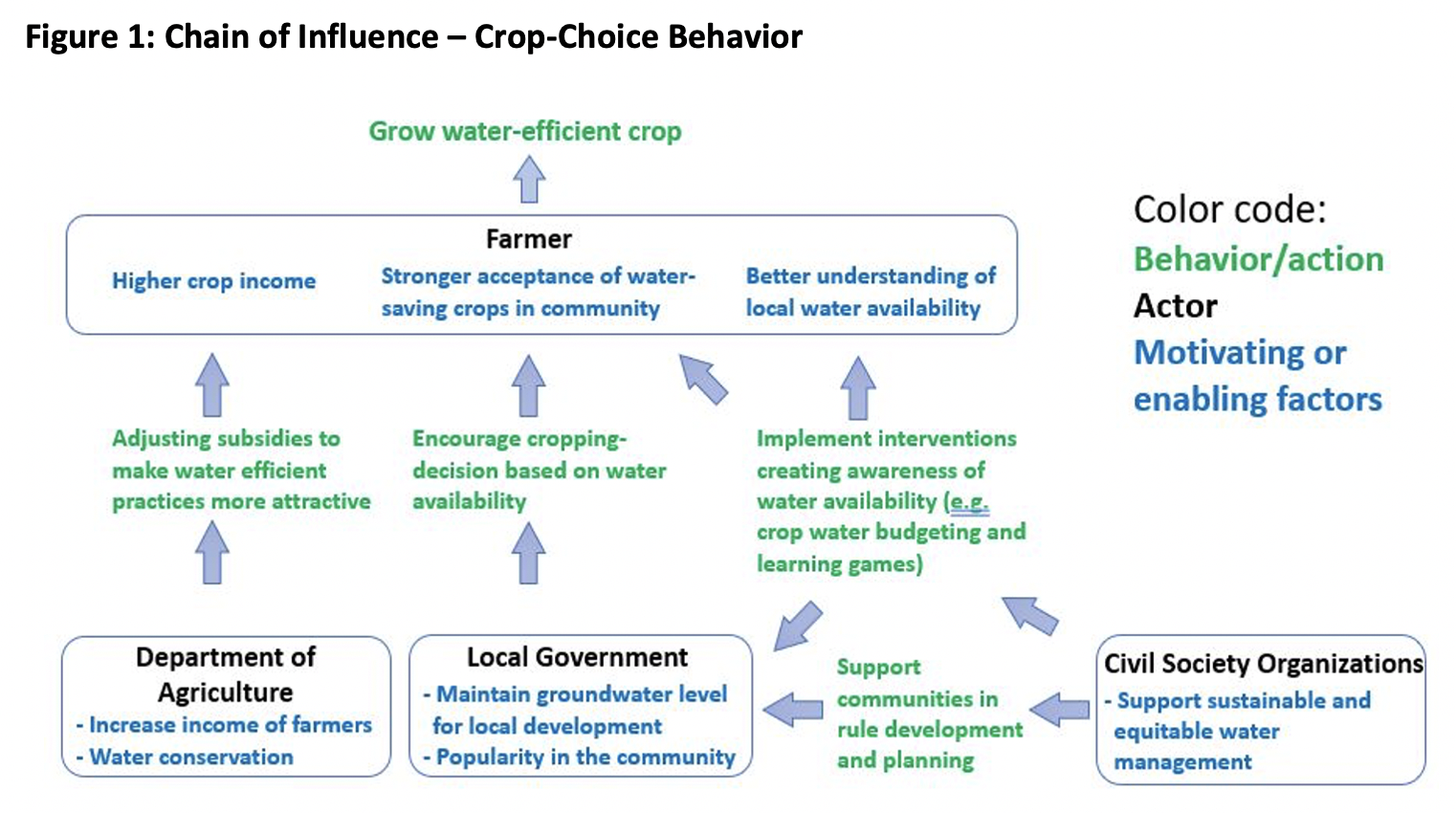India is globally the largest groundwater user and simultaneously among the world’s most water stressed countries (WRI 2016). Almost two thirds of the water requirement for irrigation and 85% of domestic water use depend on groundwater (World Bank 2010). The growing competition over water resources can only be addressed by systemic changes towards sustainable water management. These require understanding the behaviors of actors in the system network, as well as the institutions that shape the direction in which the system moves (Abson et al. 2017).
In new research, we offer a behavioral perspective to system transformation and apply it to an example in agricultural water management in India. In Feb. 2021, a team of Indian civil society organization (CSO) representatives and international agricultural researchers held a workshop reflecting on a theory of change towards achieving more sustainable and equitable rural water use. In addition, we collected data on motivation and beliefs concerning crop-choice behavior from 37 farmers who collaborate with the CSO partner the Foundation for Ecological Security. Here we present highlights of the reflection process and our data, which led to a revision of assumptions about what determines critical actors’ behavior.
Behavioral change—i.e., a long-lasting change in the way how people act—requires clarity about which actors need to change which behaviors. Then the next question is: How can key actors be motivated or enabled to change their behavior in the desired way? We consider three essential behavioral drivers: Motivation, action resources, and governance, the last of which influences the other two. Motivation, as a behavioral driver, refers to important questions such as: What do actors really want? What is their motivation, their interest, their aspiration? We propose to question often-implicit assumptions about what drives actors.
Human behavior is also driven by “action resources”: Intangible and tangible assets that determine which actions an actor is able to take (Di Gregorio et al. 2012), including financial capital, natural capital, physical capital, human capital, and social capital (Ellis 2000). As people and organizations in a system interact, the third behavioral driver, governance, can be understood as the processes through which the interactions are coordinated.
Behavioral change through water efficient crop-choice behavior
The workshop participants agreed that the overarching desirable outcome would be more equitable and sustainable water use. In this context, the choice of crops is arguably the most important decision influencing the sustainability of agricultural water use in India (Davis et al. 2018). Farmers can reduce the depletion of water resources by growing more water efficient crops (Figure 1). In the explorative survey, many farmers said that generating income was one of the main factors motivating them to either take water requirements into account or disregard them when making crop choices. The government’s current support mechanisms for farmers such as subsidies and support prices encourage intensive water use. Thus, adjustments of government support programs in favor of water-efficient crops could provide incentives acting on farmers’ motivation.

Identifying another behavioral driver, workshop participants said that farmers are often simply not aware that growing water consumptive crops lowers groundwater tables and causes unequal distribution of water in the community. In this regard, CSOs can support communities in using tools such as crop water budgeting. They help farmers to better understand the local water availability and create awareness that more efficient use of water enables more farmers to grow crops. This brings forward a specific social dilemma in communities. Often a farmer could increase income by growing a water-intensive crop. If water is scarce, this can lead to reduced farming income at the community level. CSOs can create awareness of this dilemma, for example, by using experiential learning games to increase the farmers’ acceptance of coordinating crop choices. They can also influence local leaders who play important roles in making local governance changes.
Conclusion
The partners involved in this process created quite complex actor networks. Figure 1 represents only part of this network and illustrates how reflecting on actors’ behavioral determinants and questioning assumptions is essential in the development of effective intervention strategies. In the case of water management, instead of focusing on changing policies, more attention should be given to designing “smarter” policy implementation by seeking ways to influence the behavioral drivers of mid-level officials. Some existing policy instruments such as agricultural subsidies and support prices could be applied to both stabilize farmers’ income and ensure sustainable and equitable water use. In addition, often it is assumed that farmers just need better knowledge to make more sustainable decisions. In the face of social dilemmas, knowledge alone may not be enough, and coordination that involves change in the behavioral domain, where this is currently not well accepted, may be required. Further, farmers interviewed talked mainly about income and production costs, which were not a focus of the expert workshop. Examining different perceptions about what drives different actors behavior can form the basis for the development of intervention strategies that can effectively and efficiently create impact at large scale.
Thomas Falk is a Senior Scientist with the International Crops Research Institute for the Semi-Arid Tropics (ICRISAT) Program on Enabling System Transformation, Patancheru, India; Dennis Schüpf is a graduate student with the Sustainable Use of Natural Resources Working Group, School of Business and Economics, University of Marburg, Germany; Wei Zhang is a Senior Research Fellow with IFPRI's Environment and Production Technology Division; Ilkhom Soliev is a Senior Researcher/Lecturer in the Department of Agricultural, Environmental and Food Policy, Martin Luther University Halle-Wittenberg, Germany.
This process was supported by the CGIAR Research Programs on Policies, Institutions, and Markets (PIM), led by IFPRI, and Water, Land, and Ecosystems (WLE), and the German Federal Ministry for Economic Cooperation and Development (BMZ).
This blog was originally posted in IFPRI website here.



